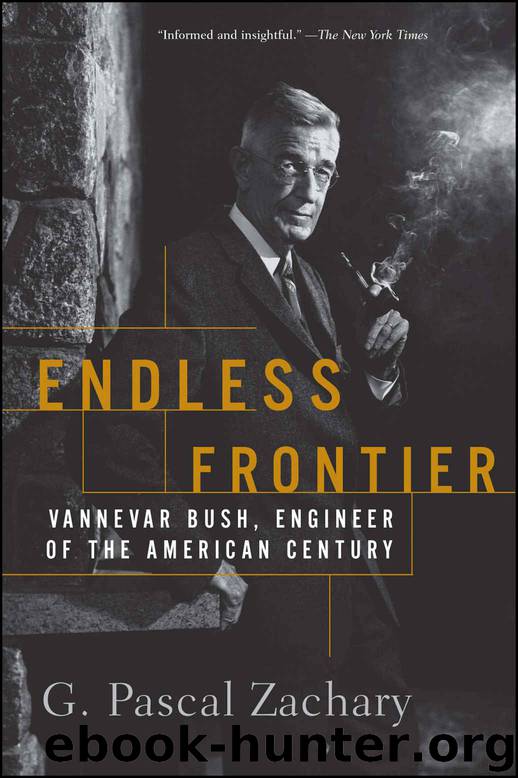Endless Frontier: Vannevar Bush, Engineer of the American Century by G. Pascal Zachary

Author:G. Pascal Zachary [Zachary, G. Pascal]
Language: eng
Format: azw3
Publisher: Free Press
Published: 2018-01-30T05:00:00+00:00
* * *
The most curious aspect of the rapid selector was its hybrid nature; though Bush did not advertise the fact, the machine was part digital. Photographic images—microfilm images—were analog, of course, in the sense that they could contain any degree of white to gray to black tone values. But the rapid selector’s selection mechanism was binary: either it made a hit or not. It was a Boolean logic system.36
Bush never embraced the binary, or digital, aspect of the rapid selector. He refused to accept the supremacy of the digital computer and struggled to grasp the basic technologies behind it. After so many years on the margins of the fast-moving computing field, in 1950 he wrote, “I am so confoundedly rusty on this whole business I have to hang on by my eyebrows when the discussion really gets going.” While in “As We May Think” he suggested that demand for computerized aids to thinking would be insatiable (“there will always be plenty of things to compute in the detailed affairs of millions of people doing complicated things”), he gradually came to believe that advocates of digital computing were overestimating the scientific applications for their machines. In 1949, he warned Von Neumann, the world’s leading computer theoretician, “After looking at the computing machine situation in the country as a whole I am rather fearful that there are some programs that have been instituted at great expense that will never go through to completion or, on the contrary, more machines will be finished than can be serviced or used.”37
Bush’s belief in the enduring value of analog computing would ultimately be borne out in the 1990s when leading-edge engineers found that analog circuits offered the most efficient means of creating electronic imitations of such complex biological organs as the eyes. While some end-of-the-century futurists even went so far as to predict the decline of digital and the triumph of analog in technologies where computer circuitry merged with bio-engineering, it was hard to deny digital had defined the electronics revolution.
Yet Bush’s postwar doubts about digital fit his time. Many of his peers hardly considered the decline of analog to be predestined. As late as 1954, the computing landscape was quite heterogeneous. One survey at MIT found that of the 488 hours of weekly work performed by various machines, less than half were handled digitally. With so many hybrid machines—devices that relied on both analog and digital techniques—in circulation, Bush resisted the conclusion that the victory of digital was inevitable. “I would feel more comfortable if I thought there was a group developing analytical machinery in this country that was not obsessed with the idea of digital machines,” he wrote in 1952. “One hears the statement very frequently that there are two kinds of machines, digital machines and analog machines. This indicates a blind spot which I think is quite prevalent. . . . I have felt for a long time that in the intermediate region there is an opportunity for machinery that is being overlooked.
Download
This site does not store any files on its server. We only index and link to content provided by other sites. Please contact the content providers to delete copyright contents if any and email us, we'll remove relevant links or contents immediately.
Enlightenment Now: The Case for Reason, Science, Humanism, and Progress by Steven Pinker(7313)
A Journey Through Charms and Defence Against the Dark Arts (Harry Potter: A Journey Through…) by Pottermore Publishing(4811)
The Immortal Life of Henrietta Lacks by Rebecca Skloot(4588)
A Journey Through Divination and Astronomy by Publishing Pottermore(4385)
Elon Musk by Ashlee Vance(4127)
Origin Story: A Big History of Everything by David Christian(3692)
COSMOS by Carl Sagan(3624)
Alchemy and Alchemists by C. J. S. Thompson(3520)
Bad Pharma by Ben Goldacre(3427)
Enlightenment Now by Steven Pinker(3368)
Shadow of Night by Deborah Harkness(3368)
Inferior by Angela Saini(3314)
A Mind For Numbers: How to Excel at Math and Science (Even If You Flunked Algebra) by Barbara Oakley(3307)
Origin Story by David Christian(3201)
The Code Book by Simon Singh(3189)
Signature in the Cell: DNA and the Evidence for Intelligent Design by Stephen C. Meyer(3138)
The Elements by Theodore Gray(3057)
A Brief History of Time by Stephen Hawking(3024)
A Journey Through Potions and Herbology (A Journey Through…) by Pottermore Publishing(2852)
